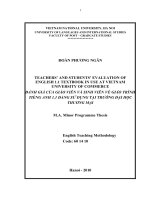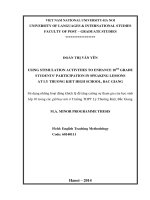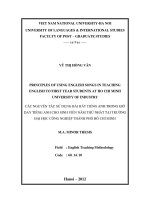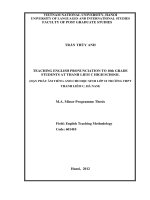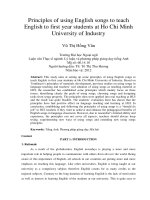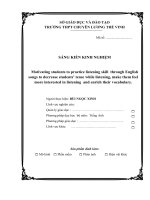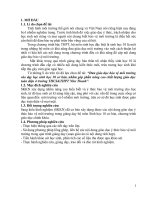USING ENGLISH SONGS TO HELP EFL 10th GRADE STUDENTS IMPROVE PRONUNCIATION KNOWLEDGE
Bạn đang xem bản rút gọn của tài liệu. Xem và tải ngay bản đầy đủ của tài liệu tại đây (164.02 KB, 23 trang )
THANH HOA DEPARTMENT OF EDUCATION AND TRAINING
NGOC LAC ETHNIC BOARDING HIGH SCHOOL
EXPERIENCE INNOVATION
USING ENGLISH SONGS TO HELP EFL 10th GRADE
STUDENTS IMPROVE PRONUNCIATION KNOWLEDGE
Writer: Đinh Văn Thiện
Position: Teacher
Topic in the fields of: English
THANH HOA 2018
1
INDEX
Page
INDEX ……………………………………………………………….. 2
A. INTRODUCTION ………………………………………………... 3
I. Reasons to choose the theme ………………………………………. 3
II. Purposes of the research ………………………………………… 3
III. Subjects of the research ………………………………………….. 3
IV. Methodology of the research. …………………………………….
3
B. CONTENTS. ……………………………………………………… 4
I. Theoretical basis of the study ………………………………………. 4
II. Reality of the issue ………………………………………………... 4
1. Advantages ………………………………………………………… 4
2. Shortcomings ………………………………………………………. 5
III. The practical basics of the theme. ………………………………… 5
1. Solutions …………………………………………………………… 5
2. Suggested solutions to run “pronunciation part” using English 6
songs in Basic English 10
IV. The assessment of experimental results. …………………………
C. CONCLUSION …………………………………………………...
1. Experience lessons …………………………………………………
2. Proposal ……………………………………………………………
REFERENCE …………………………………………………………
CONVENTIONS OF ABBREVIATIONS …………………………..
17
19
19
19
20
20
A. INTRODUCTION
I. Reasons to choose the theme
Generally, in language learning process, the learners have to master
four basic skills of language, which include the language components such
as grammatical structure, vocabulary, spelling, and pronunciation. Among
these components, pronunciation is one of the most difficult aspects to
master when it comes to learn a new language, but in fact there is no lesson
which focuses on pronunciation. Indeed, pronunciation can increase the
quality of students' speaking as Harmer stated (2001:183) that
2
pronunciation teaching not only makes students aware of different sound
and sound features, but also improve their speaking immeasurably.
Practically, the students would become not interested in learning
pronunciation if the technique used was monotonous which made the
learning process not effective. However, there is a great way which can
strengthen the students’ learning motivation – utilizing music. In fact, music
has become part of our life. We listen to music every day and we all know
that music has a great impact not only on our mental health but on our
cognitive abilities also. As an integral part of our language experience, it can
be of great value to foreign language teaching. Naturally, when we learn
English songs, we will tend to repeat the songs again and again. And hence
we will enjoy practising English instinctively.
Because of the reasons above and stimulated by the inner urge of
providing readers with deeper insight into this issue, I would like to carry
on this study entitled “Using English songs to help EFL 10 th grade
students improve pronunciation knowledge.” Hopefully, the results will
serve as a useful source of reference for those who are concerned teaching
and learning English.
II. Purposes of the research
This research endeavors to demonstrate the value of English songs in
ELT in general and English pronunciation teaching in particular.
III. Subjects of the research
Therefore in this topic, I studied generally the value of English songs in ELT
and ways of exploiting an English song in each pronunciation part in English
10.
IV. Methodology of the research.
This study was conducted at a public high school that teaches ESL:
Ngoc Lac ethnic boarding high school, Thanh Hoa province. The participants
were 10th grade students. In total, 90 students from 3 classes took part in
this study.
This main methodology used in this method was experimental.
Students experience the learning process in which English songs are
applied for teaching English pronunciation. Then, a standardized test is
conducted at the end of the second semester to assess the influence of this
method. During the process of researching, the author also consults with
the other English teachers for useful assistant, corrections, and comments.
B. CONTENTS.
I. Theoretical basis of the study.
3
We can surely become bored out of our mind by repeatedly listening
to a narration, dialogue or a even sentence as we attempt to understand the
meaning of a new word or phrase in context. Unsurprisingly, popular songs
touch the lives of us and are connected with our various interest and
everyday experiences. We listen to music to reduce anxiety, to stay positive,
to relax. The rhythm and melody of songs enable us to listen to them over
and over again. That’s why we need music to boost our motivation in
learning English.
In the same vein, Purcell (1992) states that students can become
bored with repeatedly listening to a narration or dialog as they attempt to
understand the meaning of new words or phrases in context. In contrast,
when the students are supposed to sing the song along with the recording or the
teacher line by line, they can improve listening skills with practice listening
to different forms of intonation and rhythm. (Педагогика, 13.02.2017). Also,
Murphey believes that music has the power to engrave itself into our brains,
stating that “songs work on our short-and long-term memory” and are
therefore adequate tools for using in the language classroom (1992, p. 3).
What activities should we do when teaching English with songs? To
answer this question, a great deal of researchers indicated a large number
of activities applied in language teaching process. Here are some ideas on
how to use songs with pronunciation lessons:
•
•
•
•
•
•
•
Listen and…
put the verse in the right order;
put the underline words under the right column according to …
(pronunciation transcriptions)
complete the blanks with the words in the box;
choose the right word;
check the words that you hear;
reorder the letters;
correct the words/mistake;
In the same vein, activities for exploiting songs can certainly be
employed isolation that the students require to situate the song by listening
activities within a coherent framework. These activities are classified into
three stages of framework: the pre-listening stage, the while listening stage
and the post-listening stage. This thesis focuses upon activities for the while
listening stage. Similar activities have been in circulation in EFL classrooms for
a number of years, yet they remain new to teachers participating in workshops
and training programs that the author has facilitated.
4
II. Reality of the issue
1. Advantages.
Although many problems directly affect to the teaching and learning
process, our teachers and students have overcome the difficulties and have
gradually improved the quality of teaching and learning English to meet the
constantly changing requirements of the textbook programs.
• For teachers:
- They have absorbed initially to new teaching methods.
- They have constantly improved knowledge as well as have learned
experiences from each other to promote the quality of teaching.
• For students:
- Most of them participate regularly and positively in learning English.
- They are always interested in learning new teaching methods.
2. Shortcomings.
We easily see boredom, lack of dynamism and inefficiency in the
“Pronunciation” part in “Language focus” lesson. This is what my colleagues
and I have devoted special attention. To find out the factors that lead to this
problem, we carried out a survey and perhaps below are the major causes:
• For teachers:
- They apply new methods in their teaching inconstantly.
- Many of them are not interested in listening English songs.
- Many of them do not make a sufficient preparation for every
“Pronunciation” part, some even ignore it because of their own reasons.
• For the students:
- Most of them did not use to listen English songs before.
- Their background knowledge is limited.
- Their listening skills are at the beginning level.
- Their vocabulary is not available.
III. The practical basics of the theme.
1. Solutions
Pronunciation is one of the most important things that students have
to master in order to communicate appropriately and fluently.
Despite lasting around five to seven minutes in each forty five-minute
“language focus” lesson, the activities of the “Pronunciation” section give the
learners opportunities to master the sound of the language, or phonology;
stress and rhythm; intonation and includes the role of individual sounds as
well as segmental sounds ( Richards, J. 1969). How can we achieve our goal
in such a short time? There are many factors that affect directly
effectiveness and excitement in pronouncing strategies, in which the
teacher with his teaching skills and the students’ preparation are two
extremely important ones.
1.1. What should teachers do in pronouncing teaching part?
An exciting atmosphere in learning often stimulates the teacher and
students to rush into the lesson (Gabriel, B. 2007). Therefore, motivation in
5
study is the first essential factor that needs to be created. In order to
achieve this goal, the teacher needs to have the following qualifications in
the class:
• Joviality
• Good sense of humor
• Good language skills
• Appropriate teaching method
• Enough patience and enthusiasm
Especially, the teacher’s preparation for the lesson is decisive aspect
to the success of language teaching process in general and pronouncing
teaching part in particular. Beside teaching aids and syllabus, an English
song which is appropriate to the topic and contain phonemes of words
introduced in the pronunciation part is useful for the lesson.
1.2. What should students do in pronouncing teaching part?
Basically, the learners are centered subjects in teaching process. Thus,
the success of language learning is depended significantly on their efforts.
Specifically, in order to implement a pronunciation lesson effectively, beside
the teacher’ efforts, students’ responsibility to it is really essential. Firstly,
preparation for the lesson is helpful to the students in a pronunciation
lesson. The sound, stress, rhythm as well as intonation of new words and
sentences introduced in this part can be strange to them and sometimes
interfere them to master. If students make sufficient preparation before the
lesson, they can be more confident and easy to discover more new things
related to the content by the teacher’s help and other students’ assistance.
Secondly, students should not sing along the recorder during it plays
because it makes noise and obscures the ordered sounds in the song.
Finally, students try to do the tasks in brief ways. In such a short time of this
part, they should not raise more questions to the teacher or give too many
their comments about the song.
2. Suggested solutions to run “pronunciation part” using English songs in
Basic English 10
Generally, there are two or three transcriptions of vowel or consonant
pronunciation and six sentences including these phonemes in each of the
“Pronunciation” section in English 10 curriculum. Practice reading these
sentences is necessary but sometimes boring. Instead of pronouncing this
way, teachers should use an English song to make the learning atmosphere
more enjoyable and effective.
However, the song used in the lesson is not spontaneity. It should be a
popular song lasting not more than four minutes with understandable
words or expressions, simple tunes and a number of its words have to be
concerned with the pronunciation mentioned in each lesson. Thus, a song
should be considered to choose appropriately before exploiting in each
lesson. If the song is too long, the teacher should choose one part which is
easy to listen and has the sounds introduced in the lesson. Typically, the
6
more familiar to students the song is, the more effective pronouncing
teaching is.
Moreover, there are normally some different levels of the students in
the class. Teachers should design tasks flexibly and suitably for average
ones to exploit the song. As a result, students’ replies with simple words as
well as structures, not only easy for the other students to understand but
also the teacher can easily manage the situation in a short time.
In addition, as mentioned above, the performance of a pronunciation
teaching part used a song contains three stages of framework. In each stage,
activities should be conducted quickly to control the allowed time.
In the pre-listening stage: Students engage in activities that activate schema or
background knowledge of a song’s main theme. This step may consist of
several warm-up questions to be discussed with a partner, the introduction of
some key vocabulary items and sounds or prediction activities (Gravenall, B.
1945).
In the while listening stage: Students listen to the song and complete an
assigned task. In the post-listening stage: Students analyze new phonemes;
some can also repeat some sentences or even sing the song again if they are
ready to perform.
Sixteen English songs with suggested implications to exploit in sixteen
“Pronunciation” sections in English 10 curriculum are the following.
UNIT 1: / i: / and / i /
The song exploited: Say You Will
Task 1: Teacher introduces the transcriptions and read aloud the words
given in the book
Task 2: Teacher introduces and plays the song then orders students to listen
and find out the sounds:
- Find out words which have the phoneme / i: /
Suggested answer: keep, feel, deep, lead, need
- Find out words which have the phoneme / i /
Suggested answer: will, missing, in
Task 3: Teacher orders students to listen and fill in each blank with the
missing word.
Say you will, say you will be mine I just keep ………..you tonight.
I feel so unsure, I ………..so alone, I just don't dare to open my eyes.
Into deep, going ………..too ………..I can't get you out of my mind.
Baby no matter just how hard I try I don't want to be alone tonight.
Won't you be my guilding light ………..the way to be by your side
7
Won't you be my star tonight I ………..more than a neon light.
Suggested answer: missing, feel, in, deep, lead, need
UNIT 2: / ʌ / and / a: /
The song exploited: Lemon Tree
Task 1: Teacher introduces the transcriptions and read aloud the words
given in the book
Task 2: Teacher introduces and plays the song then orders students to listen
and find out the sounds:
- Find out words which have the phoneme / ʌ /
Suggested answer: another , nothing, just, Sunday
- Find out words which have the phoneme / a: /
Suggested answer: fast, car, far, afternoon
Task 3: Teacher orders students to listen and fill in each blank with the
missing word.
I'm sitting here in the boring room
It's ………..another rainy Sunday ………..
I'm wasting my time
I got ………..to do
I'm hanging around
I'm waiting for you
But ………..ever happens and I wonder
Suggested answer: just, afternoon, nothing, nothing
UNIT 3: / e / and / æ /The song exploited: As long as you love me
Task 1: Teacher introduces the transcriptions and read aloud the words
given in the book
Task 2: Teacher introduces and plays the song then orders students to listen
and find out the sounds:
- Find out words which have the phoneme / e /
Suggested answer: head , said, get, guess
- Find out words which have the phoneme / æ /
Suggested answer: as, have, hands, glance,
Task 3: Teacher orders students to listen and fill in each blank with the
missing word.
8
Although loneliness has always been a friend of mine
I'm leavin' my life in your ………..
People say I'm crazy and that I am blind
Risking it all in a ………..
And how you got me blind is still a mystery
I can't ………..you out of my ………..
Don't care what is written in your history
As long as you're here with me
Suggested answer: hands, glance, get, head
UNIT 4: / ɒ / or / ɔ / and / ɔ: / The song exploited: Atlantis Is Calling
Task 1: Teacher introduces the transcriptions and read aloud the words
given in the book
Task 2: Teacher introduces and plays the song then orders students to listen
and find out the sounds:
- Find out words which have the phoneme / ɒ / or / ɔ /
Suggested answer: promise, on, Hollywood
- Find out words which have the phoneme / ɔ: /
Suggested answer: ignore, anymore,
Task 3: Teacher orders students to listen and fill in each blank with the
missing word.
Lady, I know it was hard,but it's much harder to ……….....There's a chance and
I'll ………..,I won't hurt you ……….., Hollywood nights we're romancin'.You can
trust me anytime somewhere, oh! babe there is someone,Oh! you're dancing in
my mind
Ohoho... little queenie, I'm your fool. Come ……….., teach me the rules and I will
send an S.O.S. for love
Ohoho... little queenie,I'm your fool you need love like I do and I will send a
S.O.S. for love
Suggested answer: ignore, promise, anymore, on
UNIT 5: / ʊ / and / u: /
The song exploited: I Do It For You
Task 1: Teacher introduces the transcriptions and read aloud the words
given in the book
Task 2: Teacher introduces and plays the song then orders students to listen
and find out the sounds:
- Find out words which have the phoneme / ʊ /
Suggested answer: look,
9
- Find out words which have the phoneme / u: /
Suggested answer: into, to, do, true
Task 3: Teacher orders students to listen and fill in each blank with the
missing word.
………..into my eyes
You will see, what you mean ………..me
Search your heart, search your soul
When you find me then, you'll search no more.
Don't tell me it's not worth trying for
You can’t tell me it’s not worth dying for
You know its ……….., everything I do, I do it for you
Suggested answer: look, to, true
UNIT 6: / ə / and / ɜ: /
The song exploited: Top the world
Task 1: Teacher introduces the transcriptions and read aloud the words
given in the book
Task 2: Teacher introduces and plays the song then orders students to listen
and find out the sounds:
- Find out words which have the phoneme / ə /
Suggested answer: around, heaven,
- Find out words which have the phoneme / ɜ: /
Suggested answer: world, heaven
Task 3: Teacher orders students to listen and fill in each blank with the
missing word.
Everything I want the ……….....to be
Is now comin' true especially for me
And the reason is clear, it's because you are here
You're the nearest thing to ……….....that I've seen
I'm on the top of the world lookin' down on creation
And the only explanation I can find
Is the love that I've found ever since you've been ……….....
Your love's put me at the top of the world
Suggested answer: world, heaven, around,
10
UNIT 7:
/ ei /, / ai / and / ɔi /
The song exploited: Right Here Waiting For You
Task 1: Teacher introduces the transcriptions and read aloud the words
given in the book
Task 2: Teacher introduces and plays the song then orders students to listen
and find out the sounds:
- Find out words which have the phoneme / ei /
Suggested answer: day, pain, say, takes, breaks, wait
- Find out words which have the phoneme / ai /
Suggested answer: line, right,
- Find out words which have the phoneme / ɔi /
Suggested answer: voice
Task 3: Teacher orders students to listen and fill in each blank with the
missing word.
Oceans apart, day after day
And I slowly go insane
I hear your ……….....on the line
But it doesn't stop the ……….....
If I see you next to never
How can we say forever
Wherever you go
Whatever you do
I will be ……….....here waiting for you
Whatever it takes
Or how my heart ……….....
I will be right here waiting for you
Suggested answer: voice, pain, right, breaks
UNIT 8:
/ aʊ / or / əʊ / and / ou /
The song exploited: Nothing’s gonna change my love for you
Task 1: Teacher introduces the transcriptions and read aloud the words
given in the book
Task 2: Teacher introduces and plays the song then orders students to listen
and find out the sounds:
- Find out words which have the phoneme / aʊ / or / əʊ /
Suggested answer: now, without, how,
11
- Find out words which have the phoneme / ou /
Suggested answer: road, so, hold,
Task 3: Teacher orders students to listen and fill in each blank with the
missing word.
If the ……….....ahead is not so easy
Our love will lead the way for us
Like a guiding star
I'll be there for you if you should need me
You don't have to change a thing
I love you just the way you are
……….....come with me and share the view
I'll help you see forever too
……….....me now
Touch me ……….....
I don't want to live ……….....you...
Suggested answer: road, so, hold, now, without
UNIT 9:
/ iə / , / eə / and / ʊə /
The songs exploited: Heal the world; Surely
Task 1: Teacher introduces the transcriptions and read aloud the words
given in the book
Task 2: Teacher introduces and plays the song then orders students to listen
and find out the sounds:
- Find out words which have the phoneme / iə / and / eə /
(The song exploited: Heal the world)
There's a place in your heart
And I know that it is love
And this place could be much
Brighter than tomorrow
And if you really try
You'll find there's no need to cry
In this place you'll feel
There's no hurt or sorrow
Suggested answer: there / eə / , really / iə /,
- Find out words which have the phoneme / ʊə / (The song exploited:
Surely)
My bravery could not convince me to stay
Surely, surely you were meant to be mine
Surely you were meant to be mine
Surely you were meant to be mine
12
Surely you were meant to be mine Surely, surely, surely
Surely you were meant to be mine
Suggested answer: surely,
UNIT 10:
/ b / and / p / The song exploited: Season in the sun
Task 1: Teacher introduces the transcriptions and read aloud the words
given in the book
Task 2: Teacher introduces and plays the song then orders students to listen
and find out the sounds:
- Find out words which have the phoneme / b /
Suggested answer: Goodbye, black, birds, be,
- Find out words which have the phoneme / p /
Suggested answer: Papa, pray, please
Task 3: Teacher orders students to listen and fill in each blank with the
missing word.
Goodbye Papa please ……….....for me
I was the ……….....sheep of the family
You tried to teach me right from wrong
Too much wine and too much song
Wonder how I got along
Goodbye Papa it's hard to die
When all the ……….....are singing in the sky
Now that the spring is in the air
Little children everywhere
When you see them, I'll be there
Suggested answer: pray, black, birds
UNIT 11:
/ d / and / t / The song exploited: Touch by touch
Task 1: Teacher introduces the transcriptions and read aloud the words
given in the book
Task 2: Teacher introduces and plays the song then orders students to listen
and find out the sounds:
- Find out words which have the phoneme / d /
Suggested answer: do, day,
- Find out words which have the phoneme / t /
Suggested answer: to, touch, time
Task 3: Teacher orders students to listen and fill in each blank with the
missing word.
When I feel the ……….....is right and your staying by my side
13
And the love you give to me makes my heart beat
When my fantasy fly away but my feelings make me stay
I see the fire in your eyes, it makes my heart beat
Do it, we'll still do it night and ……….....
You're my all time lover
Do it, we'll still do it anyway
Like there is no other
Touch by ………....., you're my all time lover
Skin to skin, come undone my cover
Suggested answer: time, day, touch
UNIT 12:
/ s / and / z /
The song exploited: Brother Louie
Task 1: Teacher introduces the transcriptions and read aloud the words
given in the book
Task 2: Teacher introduces and plays the song then orders students to listen
and find out the sounds:
- Find out words which have the phoneme / s /
Suggested answer: stay, steel, set, breaks
- Find out words which have the phoneme / z /
Suggested answer: cause, easy, paradise
Task 3: Teacher orders students to listen and fill in each blank with the
missing word.
Dear, love is a burning fire
Stay, ……….....then the flames grow higher
Babe, don't let him ……….....your heart
It's easy, it's ……….....
Girl, this game can't last forever
Why ? Why can not live together
Try, don't let him take your love from me
You're not good, can't you see brother Louie, Louie, Louie
I'm in love set you free
Oh, she's only looking to me
Only love ……….....her heart brother Louie, Louie, Louie
Only love's paradise
Oh, she's only looking to me
Suggested answer: cause, steel, easy, breaks
UNIT 13:
/ f / and / v / The song exploited: Sunny - Boney M.
14
Task 1: Teacher introduces the transcriptions and read aloud the words
given in the book
Task 2: Teacher introduces and plays the song then orders students to listen
and find out the sounds:
- Find out words which have the phoneme / f /
Suggested answer: for, feel, feet, facts, life, formed
- Find out words which have the phoneme / v /
Suggested answer: love, gave,
Task 3: Teacher orders students to listen and fill in each blank with the
missing word.
Sunny, thank you for the sunshine bouquet.
Sunny, thank you for the ……….....you brought my way.
You ……….....to me your all and all.
Now I feel ten ……….....tall.
Sunny one so true, I love you.
Sunny, thank you for the truth you let me see.
Sunny, thank you for the ……….....from A to Z.
My ……….....was torn like a windblown sand,
And the rock was formed when you held my hands.
Sunny one so true, I love you.
Suggested answer: love, gave, feet, facts, life
UNIT 14:
/ g / and / k /
The song exploited: Something just like this
Task 1: Teacher introduces the transcriptions and read aloud the words
given in the book
Task 2: Teacher introduces and plays the song then orders students to listen
and find out the sounds:
- Find out words which have the phoneme / g /
Suggested answer: gold, gifts,
- Find out words which have the phoneme / k /
Suggested answer: book, risk, kiss
Task 3: Teacher orders students to listen and fill in each blank with the
missing word.
I've been reading books of old
The legends and the myths
Achilles and his ……….....
Hercules and his ……….....
Spiderman's control
And Batman with his fists
And clearly I don't see myself upon that list
15
But she said, where d'you wanna go?
How much you wanna……….....?
I'm not looking for somebody
With some superhuman gifts
Some superhero
Some fairytale bliss
Just something I can turn to
Somebody I can ……….....
Suggested answer: gold, gifts, risk, kiss
UNIT 15:
/ θ / and / ð /
The song exploited: Every Day I Love You
Task 1: Teacher introduces the transcriptions and read aloud the words
given in the book
Task 2: Teacher introduces and plays the song then orders students to listen
and find out the sounds:
- Find out words which have the phoneme / θ /
Suggested answer: something, thought,
- Find out words which have the phoneme / ð /
Suggested answer: that, they, time
Task 3: Teacher orders students to listen and fill in each blank with the
missing word.
I don't know but I believe
……….....somethings are meant to be
And that you'll make a better me
Everyday I love you
I never ……….....that dreams came true
But you showed me that ……….....do
You know that I learn ……….....new
Everyday I love you
Suggested answer: that, thought, they, something
UNIT 16:
/ ʒ / and / ʃ /
The song exploited: Why Not Me?
Task 1: Teacher introduces the transcriptions and read aloud the words
given in the book
16
Task 2: Teacher introduces and plays the song then orders students to listen
and find out the sounds:
- Find out words which have the phoneme / ʒ /
Suggested answer: just,
- Find out words which have the phoneme / ʃ /
Suggested answer: shadows, shattered
Task 3: Teacher orders students to listen and fill in each blank with the
missing word.
Escaping nights without you with ……….....on the wall
My mind is running wild trying hard not to fall
You tell me that you love me but say I'm ……….....a friend
My heart is broken up into pieces
'Cause I know I'll never free my soul
It's trapped in between true love and being alone
When my eyes are closed the greatest story told
I woke and my dreams are ……….....here on the floor
Suggested answer: shadows, just, shattered
3. The standardized test (conducted at the end of the second semester to
assess the influence of this method)
GENERAL ENGLISH TEST (B1)
LISTENING AND PRONUNCIATION
(Time allowed: 15 minutes)
Section 1
You will hear people talking in eight different situations. For questions 1 – 8,
choose the best answer (A, B or C).
1. You hear a young man talking about his hobby of rock climbing.
How does he feel about it?
A. satisfied with his level of expertise
B. concerned about doing a dangerous sport
C. proud when he copes with difficult conditions
2. You hear a public announcement at a family theme park.
What does the announcement contain?
A. a change to a timetable
B. details of a new attraction
C. instructions about a location
3. You hear two people talking about a course they have attended.
17
What was the topic of the course?
A. book illustration
B. journalism
C. publishing
4. You hear two people talking about a film they have both seen.
What do they agree about?
A. The story wasn’t very original.
B. Reviews of the film weren’t accurate.
C. The message wasn’t very positive.
5. You hear a man being interviewed about a new project he has set up in his
hometown.
What is the purpose of the project?
A. to reduce the amount of litter on a town’s streets
B. to increase the inhabitants’ awareness of recycling
C. to stop shopkeepers using plastic bags for customers’ purchases
6. You hear a man talking on the radio about salespeople.
What does he say about them?
A. They take pride in forming good relationships with buyers.
B. They keep one objective in mind at all times.
C. They prefer people they think are easy to sell to.
7. You hear two friends talking about a student website.
What do they agree about it?
A. It is visually attractive.
B. It has a lot of useful advertisements.
C. It is easy to navigate round.
8. You hear a chef talking about taking part in a cookery competition.
What did he find surprising?
A. How nervous he felt.
B. How rushed he felt.
C. How tired he felt.
18
Section 2
You will hear a man called Chris Graham talking to a group of students
about a vacation job he had in Australia.
For questions 9 – 18, complete the sentences with a word or short phrase.
My Vacation Job in Australia
Chris thinks the best place to find a job like he had is the (9) ____________ .
Chris is studying (10) ____________at university. For most of the time he
was working for the travel company, Chris lived in a (11)
____________outside of the town. Chris was often asked to go to a
(12)____________at the weekend.
In the mornings, Chris had to drive tourists to see the (13)____________
in the desert. Many of the tourists were unaware of the need to keep their
(14)____________covered up when they were in the sun. The tourists
particularly wanted to know how to tell the difference between the
(15)____________
of the wild animals. In the afternoons, the tourists were able to see
some(16)____________that had more than one use. Chris says that the local
government would like to have a larger (17) ____________to attract tourists.
Chris advises other students to send off their job application forms in the
month of (18)____________at the latest.
Section 3
Find a word that has the underlined part pronounced differently from that of
the others.
19. A. silent
20. A. cup
21. A. although
22. A. plays
23. A. team
24. A. state
25. A. cost
B. film
B. runner
B. southern
B. reads
B. beat
B. status
B. bore
C. thriller
C. stadium
C. theater
C. listens
C. defeat
C. station
C. course
D. situation
D. fun
D. these
D. stops
D. great
D. statue
D. tall
IV. The assessment of experimental results.
As mentioned above, the main methodology used in this study was
experimental method in which English songs are applied for teaching
English pronunciation and a standardized test is conducted at the end of the
second semester to assess the influence of this method towards the
participants.
19
In a specific way, I applied the study towards class 10A3, other while I
used casual methods for class 10A4 and class 10A5 in pronunciation teaching
parts. This study was conducted in the early September 2017 and finished at the
end of April 2018. At the beginning, before conducting the study, these classes
had the same academic level. However, I have following different results
through the assessment process after the methodology was applied.
Items in the assessment
Students have high inspiration in
10A3
25/30
10A4
10/30
10A5
12/30
learning
Students can pronounce properly and
18/30
5/30
4/30
fluently
and the results from the standardized test:
Class
Mark
10A3
10A4
10A5
Under 5
3/30
7/30
8/30
5
8/30
15/30
16/30
Over 5
21/30
8/30
6/30
In fact, language competence of students in mountainous areas in general
and Ngoc Lac ethnic boarding high school in particular is at a low level.
Therefore, it is easy to see the excitement and learning outcomes in English
class are not good unless appropriate teaching methods are applied, class 10A4
and 10A5 are samples in the pronunciation lessons. However, when I used this
method by exploiting English songs in pronunciation lessons forward class
10A3, as in the tables above, I achieved significant positive results.
The data from the tables, thank to this method, students in class 10A3
proved to be more active and interested in class. There are 18 out of 30 the
students who can pronounce properly and fluently whereas the numbers in two
other classes are 4 and 5 in context. In addition, the students in class 10A3 who
got good marks from the standardized test is significantly higher than the
others.
The results of the research suggest that using songs appropriately in
pronunciation lessons are effective forwards the participants in my school. I
hope that the study will be a valuable reference and useful to the teachers and
the students at Ngoc Lac ethnic boarding high school as well as others who
are interested in the problem.
20
C. CONCLUSION
1. Experience lessons:
Basing on actual teaching of my colleagues as well as mine in the
previous time combined with results obtained by applying the research above, I
would like to mention some following implications.
Changing Vietnamese teachers’ and learners’ attitudes towards new
English pronunciation teaching will not be easy, for they are accustomed to
traditional pronunciation lessons. And we should note the fact that applying
traditional methods in Vietnamese context in particular brings several
advantages. Since teachers are more familiar with these methods, they have
experience and confidence when conducting the lessons. The learners may feel
safer in practicing the teacher’s very careful explanations of pronunciation rules.
However, sometimes applying traditional methods is not effective in language
learning process because these methods are not motivate and even boring
towards many learners as well as a number of teachers.
In other words, when teaching pronunciation to students, teachers should not
convey all the content mechanically at the same time while they are not willing
to obtain it. From my experiment above, it can be seen that an approach via
songs can help learners study and practice pronunciation patterns positively and
effectively. Nevertheless, the song a long with the tasks concerned is not
always relevant to every lesson. It should be considered to choose
appropriately before exploiting in each lesson. Nowadays, with the
development of internet and technology, it is quite easy for teachers to search for
songs as their teaching materials from sources such as YouTube, ITunes,
Billboard, etc.
In addition, through different songs, students can even study external
language items such as grammar, vocabularies and expressions which are not
included in daily syllabus if these song are appropriate and interesting.
2. Proposal
Because of the fact that the participants in the research were students in
grade 10 only, there are certain limitations. I am looking forward to learning the
other research which is concerned with this topic applied for students in two
other grades in high school.
The study was carried out by myself accompanied my colleagues. Though
the study is applied effectively forwards the participants in my school, it may
not be suitable with other students in other schools in context. Thus, I would like
to receive comments and suggestions from you who have passion and
enthusiasm towards the development of Vietnam education.
Thanh Hoa, 10th May 2018
21
Identity of the headmaster
I make sure that this experience innovation
was done by me.
Author
Đinh Văn Thiện
REFERENCE
1. 1985. Harmer, J. The Practice of English Language Teaching.
2. Педагогика (13.02.2017). Using songs and music in teaching English to
young learners
3. Gabriel, B. (2007). Learning English Through Songs. Singapore: Bettyland
Publications.
4. Richards, J. (1969). Songs in Language Learning. TESOL Quarterly, 3(2),
161-174.
5. Gravenall, B. (1945). Music in Language-Teaching. ELT Journal, 3(5),
123-127.
Sources:
1. />2. />%20Author]%20AND%201992%20[Create%20date]
3. />oad/228/182
CONVENTIONS OF ABBREVIATIONS
EFL
English as a foreign language
22
ELT
ESL
English language teaching
English as a second language
23


